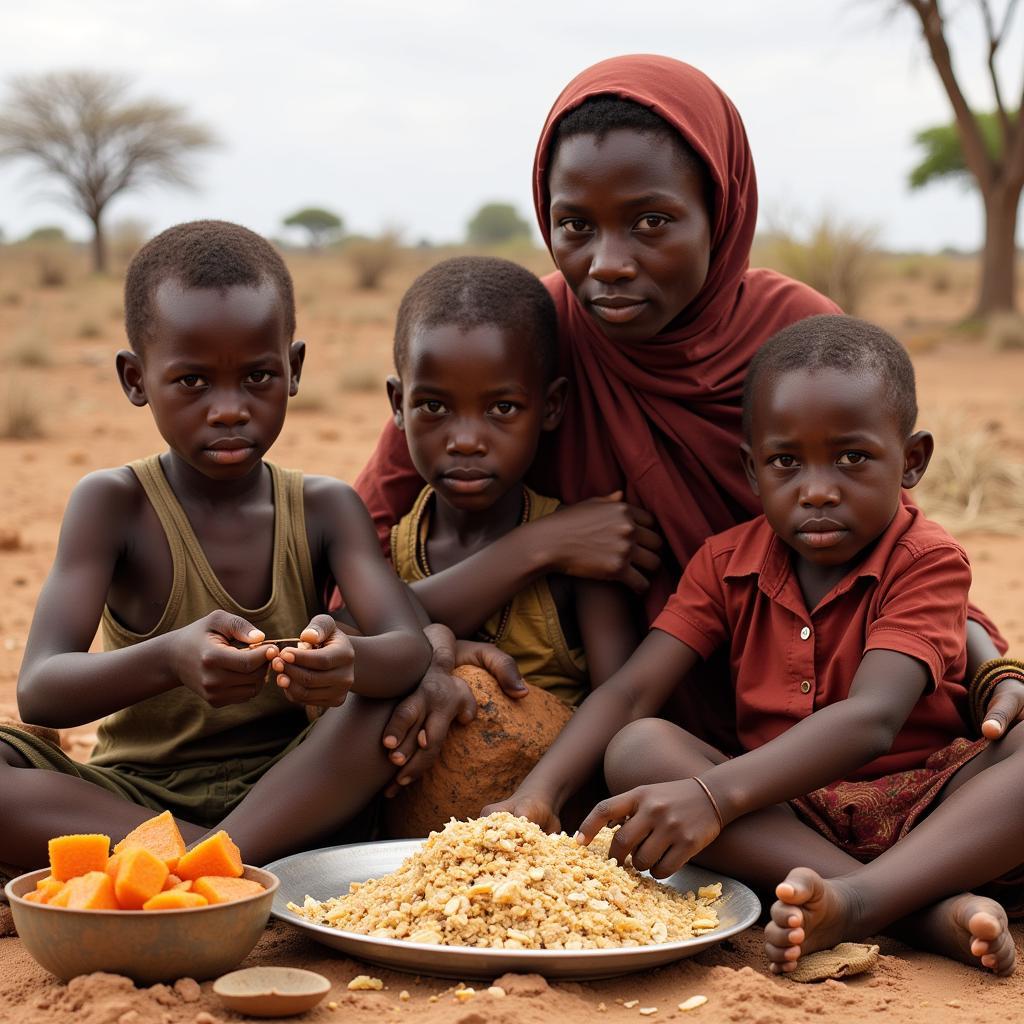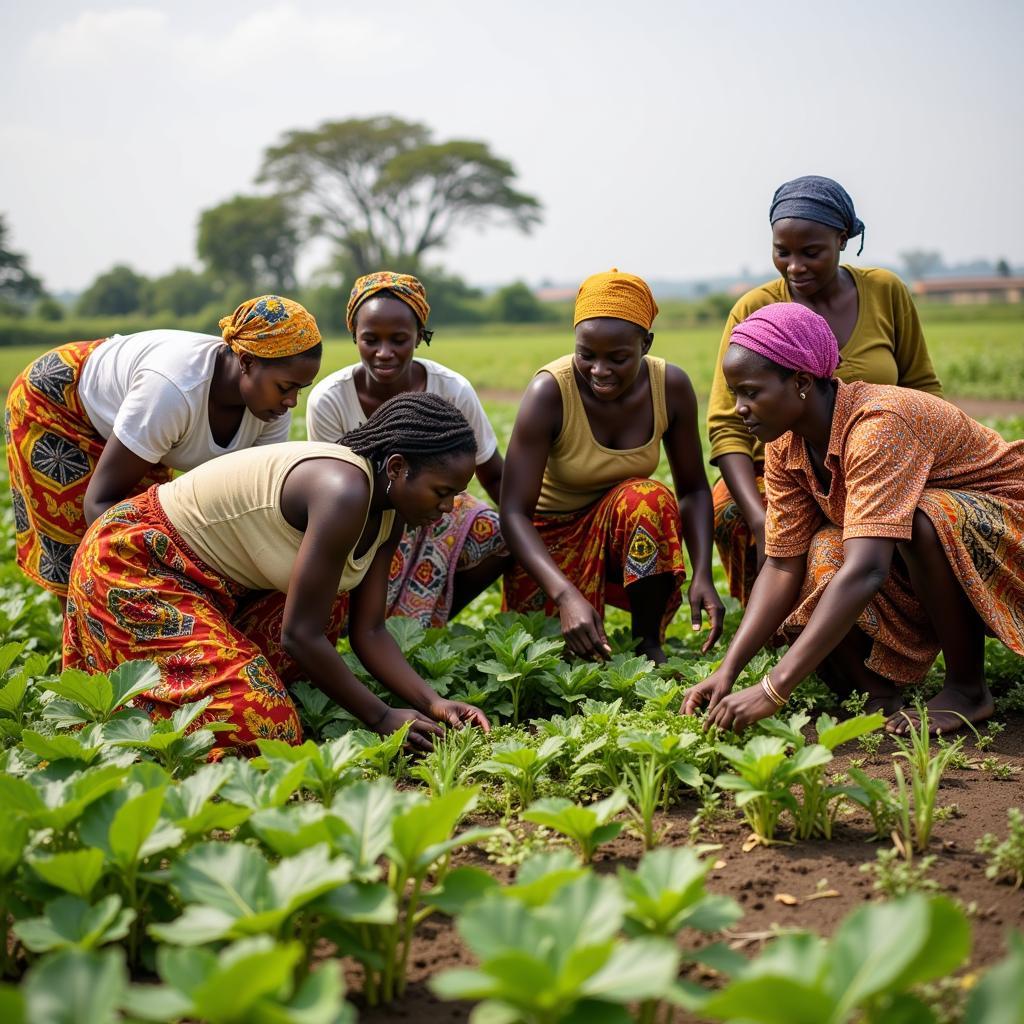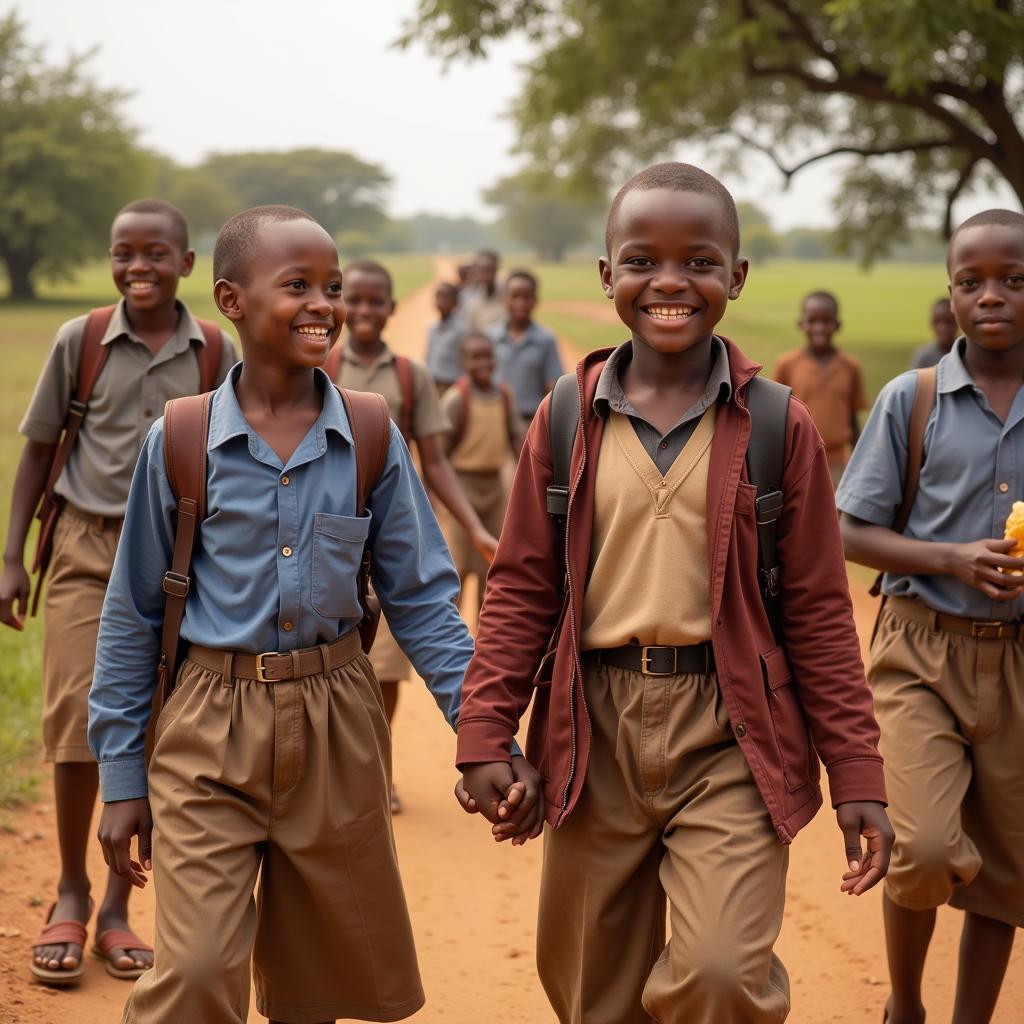The African Child Stomach: Understanding Malnutrition and Its Impact
The African Child Stomach, often impacted by malnutrition, reflects a complex interplay of socioeconomic factors, climate change, and limited access to healthcare. This pressing issue demands a multifaceted approach, combining sustainable agricultural practices, improved healthcare infrastructure, and targeted nutritional interventions.
Unveiling the Silent Crisis: Prevalence of Malnutrition in Africa
Malnutrition casts a long shadow across the African continent, affecting millions of children under the age of five. This silent crisis manifests in various forms, with the most common being stunting, wasting, and micronutrient deficiencies. While each type presents unique challenges, they collectively hinder a child’s physical and cognitive development, trapping them in a cycle of poverty and poor health.
 A young African child suffering from the visible effects of malnutrition
A young African child suffering from the visible effects of malnutrition
Stunting, characterized by low height for age, is a prevalent form of malnutrition, affecting an estimated 39% of children under five in Africa. This alarming statistic underscores the long-term consequences of inadequate nutrition, as stunted children face increased risks of impaired cognitive development, reduced economic productivity, and chronic diseases later in life.
The Vicious Cycle: Underlying Causes of Malnutrition
The roots of malnutrition in Africa run deep, entwined with a complex web of interconnected factors. Poverty, often exacerbated by conflict and displacement, remains a primary driver, limiting access to nutritious food, clean water, and basic sanitation.
 An African family struggling to access nutritious food amidst poverty and drought
An African family struggling to access nutritious food amidst poverty and drought
Furthermore, inadequate healthcare infrastructure, particularly in rural areas, hinders early diagnosis and treatment of malnutrition. Limited access to essential healthcare services, such as immunization and antenatal care, further compounds the problem, leaving children vulnerable to preventable diseases that can worsen malnutrition.
Climate change adds another layer of complexity, disrupting agricultural practices and increasing the frequency of extreme weather events, such as droughts and floods. These disruptions exacerbate food insecurity, particularly in communities heavily reliant on subsistence agriculture.
Breaking the Chains: Combating Malnutrition Through Multifaceted Approaches
Addressing the multifaceted challenge of malnutrition requires a comprehensive and collaborative approach. Governments, international organizations, and local communities must work in unison to implement sustainable solutions that tackle both the immediate and underlying causes of this crisis.
Empowering Communities Through Sustainable Agriculture:
Promoting sustainable agricultural practices that enhance food security is paramount. This includes supporting smallholder farmers, particularly women, with access to improved seeds, fertilizers, and irrigation techniques. Diversifying food production systems to include a wider range of nutrient-rich crops can also enhance dietary diversity and improve overall nutrition.
Strengthening Healthcare Systems and Access:
Investing in healthcare infrastructure, particularly in underserved rural areas, is crucial. This includes establishing and equipping health centers with the necessary resources to diagnose and treat malnutrition effectively. Training healthcare workers to identify and manage malnutrition cases early on is equally important in preventing severe and long-term consequences.
Promoting Breastfeeding and Early Childhood Nutrition:
Encouraging exclusive breastfeeding for the first six months of life, followed by continued breastfeeding alongside appropriate complementary feeding, is vital. Breast milk provides all the essential nutrients an infant needs for optimal growth and development, while also strengthening their immune system.
A Call to Action: Investing in the Future of Africa’s Children
The plight of the African child stomach is a stark reminder of the urgent need for collective action. Malnutrition is a solvable crisis, and by addressing its root causes and implementing sustainable solutions, we can break the cycle of poverty and ensure a brighter future for Africa’s children. Investing in their nutrition is investing in the future of the continent.
Frequently Asked Questions (FAQs)
What are the long-term effects of malnutrition?
Malnutrition can have devastating long-term effects, including stunting, impaired cognitive development, weakened immune systems, increased susceptibility to chronic diseases, and reduced economic productivity.
How can I contribute to the fight against malnutrition in Africa?
You can contribute by supporting organizations working to combat malnutrition, raising awareness about the issue, advocating for policy changes, and making informed choices as a consumer.
african child drinking dirty water
What are some of the most effective interventions to prevent malnutrition?
Effective interventions include promoting breastfeeding, ensuring access to nutritious food and clean water, improving sanitation, providing micronutrient supplements, and addressing underlying causes like poverty and inadequate healthcare.
How does climate change exacerbate malnutrition?
Climate change disrupts agricultural practices, increases the frequency of extreme weather events like droughts and floods, and reduces the nutritional value of crops, all of which contribute to food insecurity and malnutrition.
What is being done to address the issue of malnutrition in Africa?
Governments, international organizations, and local communities are working to address malnutrition through various initiatives, including promoting sustainable agriculture, strengthening healthcare systems, improving access to clean water and sanitation, and implementing social safety net programs.
african child who was going to dying of hunger
Looking for More Information?
If you’d like to delve deeper into specific aspects of this critical issue, you can find additional resources on our website. We encourage you to explore further and join us in the fight against malnutrition in Africa.
Need Help or Want to Get Involved?
Every action counts! If you are passionate about making a difference in the lives of vulnerable children, please reach out to us. Contact our dedicated team at +255768904061 or kaka.mag@gmail.com. You can also visit us at our office in Mbarali DC Mawindi, Kangaga, Tanzania. We are available 24/7 to assist you. Together, we can create a brighter and healthier future for Africa’s children.





